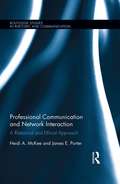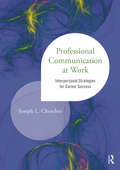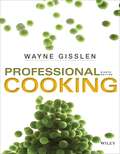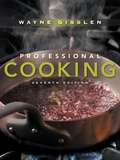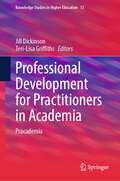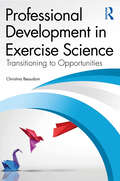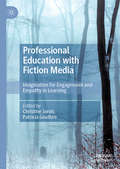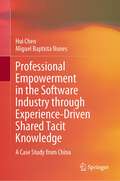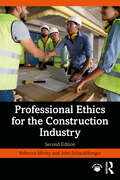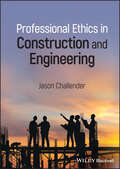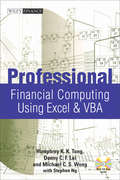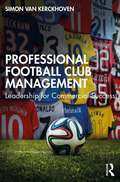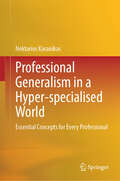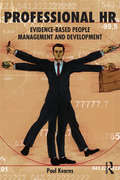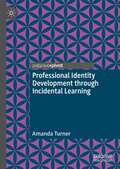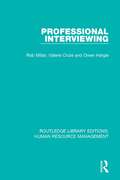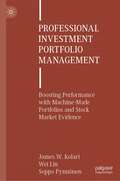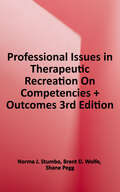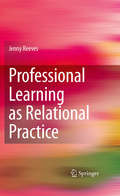- Table View
- List View
Professional Communication
by Goodheart-Willcox PublisherThis book takes an integrated approach to teaching English/language arts skills that are vitally important in today's digital environment. The basic skills of writing, speaking, listening, and reading are interwoven into the content as each skill is presented and applied in context. <p><p>Students are guided through a step-by-step writing process to create clear and concise messages and develop professional skills that are that are sought after in the workplace. Topics such as making presentations, grammar basics, and digital citizenship prepare students for success in college and career and to become effective contributors in the 21st century. <p><p>Writing for specialized purposes, such as technical writing and social media, guides the development of writing expertise needed in today's job market. Portfolio development activities provide an opportunity for students to create a personal portfolio to use when applying for college, a community service position, or a job. <p><p>Exploring Communication Careers features examine a wide variety of opportunities in the Arts, A/V Technology and Communication career cluster. Career planning chapters help students to prepare, apply, and begin the first day on a job.
Professional Communication
by Shikha ShuklaTechnical communications, constituents of technical written communications, their forms and presentation strategies are explained in detail in this volume.
Professional Communication and Network Interaction: A Rhetorical and Ethical Approach (Routledge Studies in Rhetoric and Communication)
by James E. Porter Heidi A. McKeeDigital technologies and social media have changed the processes, products, and interactions of professional communication, reshaping how, when, with whom, and where business professionals communicate. This book examines these changes by asking: How does rhetorical theory need to adapt and develop to address the changing practices of professional communication? Drawing from classical and contemporary rhetorical theory and from in-depth interviews with business professionals, the authors present a case-based approach for exploring the changing landscape of professional communication. The book develops a rhetorical theory based on networked interaction and rhetorical ethics: seeing professional communication as involving new kinds of networked interactions that require an integrated view of rhetoric and ethics. The book applies this frame to a variety of communication cases involving, for example, employee missteps on social media, corporate-consumer interactions, and the developing use of artificial intelligence agents (AI bots) to handle online communication.
Professional Communication at Work: Interpersonal Strategies for Career Success
by Joseph L. ChesebroThis text prepares future professionals for success in the workplace through identifying interpersonal communication skills and strategies and exploring when, how, and why to use them. Informed by academic research, professional literature, and author Joseph L. Chesebro’s own experiences, the text explores and demonstrates the skills that have facilitated Chesebro’s own students to find work and to succeed in their professional lives. Offering a very practical focus on such topics as handling conflict and giving dynamic presentations, Professional Communication at Work also covers essential interpersonal communication skills that are often not discussed, such as: Using networking when job hunting; Earning a good reputation as a new employee Using storytelling and questioning more often Developing coaching relationships with the best senior employees in our workplace, Practicing and developing new skills on our own, and Using workplace politics in a positive and constructive way to accomplish our goals. Utilizing the approach of a supportive communication coach, this text will help readers gain a variety of practical communication strategies they can apply to contribute to success in their own careers.
Professional Cooking (Eighth Edition)
by Wayne GisslenProfessional Cooking, 8th Edition reflects the changing nature of our understanding of cooking and related fields such as food safety, nutrition, and dietary practices, as well as new thinking about how best to teach this material.
Professional Cooking (5th edition)
by Wayne Gisslen Andre CointreauIn collaboration with Le Cordon Bleu, Gisslen provides a comprehensive guide to professional cooking theory and techniques for culinary students. This heavy tome contains about 1,200 recipes--100 of them new to this edition. The extensive scope of the book encompasses the food service industry, sanitation and safety, tools and equipment, the basics, menus and cost management, and nutrition. Then, the author provides detailed instructions, with color photos by J. Gerard Smith, for cooking stocks and sauces; soups; meats, game, and poultry; fish and shellfish; vegetables; legumes, grains, and pasta; salads; sandwiches; appetizers; breakfast foods; beverages; cured foods; cold foods; yeast products and breads; and desserts. This edition has been updated, is in full-color, contains vegetarian recipes and diets, uses the new food pyramid, and has chapters on presenting and garnishing food and modern food service. Gisslen is the author of many other culinary books, including The Essentials of Professional Cooking and Professional Baking, and is a graduate of the Culinary Institute of America. Annotation ©2006 Book News, Inc. , Portland, OR (booknews. com)
Professional Cooking (7th edition)
by Wayne Gisslen Mary Ellen GriffinThis is the best-selling undergraduate food preparation textbook in the marketplace. It has a long standing reputation for being comprehensive, yet easy for students to understand and follow. Wayne Gisslen's reputation for being able to simply, yet comprehensively, communicate information to beginning chefs is unsurpassed. Professional Cooking, Seventh Edition includes videos that will help further illustrate the correct techniques in the kitchen. On top of that there are over 100 new recipes, some with particular emphasis on international cooking. Enhanced visual program includes over 220 new color photos, including plated dishes, procedures, and products. Approximately 100 new recipes have been added, for a total of 650 recipes plus another 600 variations. More focus on international recipes and variations. Enhanced topical coverage on such things as: food science, molecular gastronomy, international recipes, and culinary maths. Chapter 10, Understanding Meats, now includes all information on meat fabrication in one convenient place. Up-to-date nutrition guidelines. Thoroughly revised and enhanced CulinarE-Companion Recipe Management software contains all recipes from the book - and 90 bonus recipes. The software is available through download with the registration code in the back of the book.
Professional Curiosity in Safeguarding Adults
by Bridget Penhale Ann Anka Helen Thacker Walter Lloyd-Smith Becky BoothThis is an essential text for students at all levels studying social work, nursing and allied health and social care, focusing on the need for professional curiosity and partnership work in safeguarding adults. Professional curiosity is a vital element of professional health and social care practice, yet information and guidance are scarce. Considering the post-pandemic landscape and the legal policy context of partnership work, this text provides a detailed examination around definitions of professional curiosity and what those mean in practice in relation to vulnerable adults. Real life examples are woven throughout based on serious case reviews, safeguarding adults’ reviews, domestic homicide reviews and extensive research, and there are numerous opportunities for readers to test their knowledge and skills.
Professional Development at DLA Piper-Building the Strength of Global Legal Talent
by Heidi K. Gardner Nico ThornleyCase
Professional Development for Practitioners in Academia: Pracademia (Knowledge Studies in Higher Education #13)
by Jill Dickinson Teri-Lisa GriffithsThis multi-disciplinary collection addresses issues relating to current or former practitioners within the context of higher education. Drawing together a range of voices, the contributors explore contemporary issues organised around three core themes of pracademic identities, professional development, and teaching practice. Underpinned by theoretical frameworks, reporting empirical findings, and adopting a reflective lens, this critical examination draws on a range of experiences to provide a deeper understanding of the contribution of pracademics within the sector for stakeholders, including leaders, policy makers and professional bodies, and current and future pracademics. Dedicated to highlighting the potential of the pracademic contribution, this collection explores key topics including building networks, practice-informed teaching, consultancy, and collaborative research. Contributions investigate some of the practical barriers faced by pracademics making the transition into higher education, including imposter syndrome, cultural adjustment, and managing dual professional identities. The aim of this collection is to champion the benefits of a diverse academy for everyone involved.
Professional Development in Exercise Science: Transitioning to Opportunities
by Christina BeaudoinProfessional Development in Exercise Science prepares students and complements their extensive academic foundation for a career or professional opportunity within the field of exercise science. This textbook provides students with the knowledge and skills to bridge gaps more effectively between their academic preparation and their chosen profession. There is an extensive array of career and professional options for students within exercise science, and this textbook will help develop a deeper understanding of how to navigate the personal and professional world confidently. The textbook integrates insights from communication, business, leadership, psychology, and exercise science to explore the dynamic interplay between the personal and the professional realms, providing a deeper understanding of the interconnections between the two.This new text, the first of its kind in the field of exercise science, is invaluable for all exercise science and kinesiology students. Students aspiring to careers within the discipline and related sub-disciplines, as well as those exploring postgraduate studies, will gain insights into the critical intersections between personal growth and professional achievement.
Professional Discourse
by Kenneth KongUsing a wide range of professional genres such as research papers, business reports, performance commentaries, guidebooks and legal documents, this study focuses on the discourse of professional writing, employing analytic paradigms from systemic-functional linguistics, pragmatics, text analysis, sociology and anthropological linguistics. Kenneth Kong argues that while professions use different sets of practices, their use of language displays many universals. This is demonstrated through the analysis of data from a broad cross-section of professional settings such as medicine, law, business, mass media and engineering. This examination of professional discourse, and its important role in society, will be of interest to researchers in applied linguistics, to professionals who want to understand the role of language in their work, and to teachers of English for specific purposes.
Professional Education with Fiction Media: Imagination for Engagement and Empathy in Learning
by Christine Jarvis Patricia GouthroThis book analyses how narrative fictions can be used by faculty and staff in the teaching of professionals in higher education. As professional life becomes ever more demanding, this book draws together the work of researchers and practitioners who have explored the tremendous impact that narrative fictions – novels, short stories, drama and poetry – can have on development. The editors and contributors posit that fiction can help professionals imagine new ways of being, reinvent their roles and tackle problems without a road map. Using fiction can also provide a safe place for the exploration of ethics and decision making, as well as furnishing tools for the development of empathy and engagement by offering vicarious experiences of drastically different lives and situations. A medium that by its very nature contains a multiplicity of interpretations, using fiction in professional education can enhance the education of professionals working in a range of disciplines, including health, education, social care, law and science.
Professional Empowerment in the Software Industry through Experience-Driven Shared Tacit Knowledge: A Case Study from China
by Hui Chen Miguel Baptista NunesThis book addresses the identification and classification of knowledge acquired through experience that results from engaging in professional activities within the software industry. As a result of this study, the book presents an ontology of such professional activities that require and enable the acquisition of experience and that, in turn, are the basis for tacit knowledge creation. The rationale behind the creation of such an ontology was based on the need to externalize this tacit knowledge and then record such externalizations so that these can be shared and disseminated within and across organizations. The book discusses the very concise manner in which experienced software development practitioners in China understand the nature and value of experience in the SW industry, effectively communicate with other stakeholders in the software development process, are able and motivated to actively engage with continuous professional development, are able to share knowledge with peers and the profession at large, and effectively work on projects and exhibit a sound professional attitude both internally to their own company and externally to customers, partners, and even competitors. The book also discusses the ontology and the qualitative process that are generated by bridging two extremely topical aspects of practice in the software industry, namely, employability skills and competencies. The book is of interest to academics in the areas of knowledge management and information systems, as well as human resources practitioners concerned with selection and development and knowledge and information professionals in software organizations.
Professional Ethics for the Construction Industry
by John Schaufelberger Rebecca MirskyThis second edition of Professional Ethics for the Construction Industry empowers a new generation of built environment professionals to navigate the ethical challenges confronting them at every stage of a project, from the initial bid to its completion and beyond. Authored by a pair of veteran educators and industry professionals, this textbook introduces ethical dilemmas aspiring construction professionals will face on the job—and the critical thinking skills to reason their way out of them. Written to meet curriculum requirements for all levels of construction education, this book explores ethics specific to the construction industry, illustrated by detailed and realistic case studies. All-new chapters on privacy, cutting-edge technologies, and pandemic-era worker protections complement chapters on perennial ethical issues surrounding the environment, client relationships, and more. Features include: • Completely revised and updated to reflect changes in construction technology, workforce composition, and working environments. • Updated to include new chapters on social media, privacy and technology, and construction during a disease outbreak or natural disaster. • Ideal reading for courses in professional ethics, leadership, construction law, workforce readiness, and continuing education. • Downloadable instructor's manual with commentary on scenarios provided at the end of each chapter. As vital on the jobsite as in the classroom, Professional Ethics for the Construction Industry guides aspiring design and construction professionals through the thorniest on-the-job conundrums.
Professional Ethics in Construction and Engineering
by Jason ChallenderProfessional Ethics in Construction and Engineering A comprehensive and incisive how-to guide that walks readers through the implementation of robust ethical standards in everyday construction management and decision-making Recent and high-profile incidents—including the 2017 Grenfell Tower tragedy and the Lakanal House fire in 2009—have been attributed to failures in the building construction, design, and certification industries. Some commentators have suggested that, while professional construction organizations are bound by codes of ethics, such codes may be downplayed or sometimes even ignored in the day-to-day activities of construction professionals. Professional Ethics in Construction and Engineering is a practical and industry-aligned guide on ethical practice in construction management. The book addresses how existing ethical standards should be applied in daily practice and offers case studies and examples to illustrate their effective implementation. The author also provides a toolkit that can be employed by frontline managers facing common ethical dilemmas. Readers will find: Thorough discussions of how problematic and dangerous ethical situations arise and how they should be addressed In-depth explorations of conflicts between legal and moral expectations, as well as mismatches between clients’ business goals and the duties of contracting organizations Playbooks for how impactful decisions should be made and how to uphold ethical standards and values Comprehensive review of existing ethical standards and the legal requirements binding construction professionals found in organizations like RICS, RIBA, and the CIOB A must-read document for construction management practitioners, Professional Ethics in Construction and Engineering will also be invaluable to construction clients, contractors, surveyors, and architects, as well as students of construction-related disciplines at undergraduate and postgraduate level.
Professional Financial Computing Using Excel and VBA (Wiley Finance #762)
by Donny C. Lai Humphrey K. Tung Michael C. Wong"Professional Financial Computing Using Excel and VBA is an admirable exposition that bridges the theoretical underpinnings of financial engineering and its application which usually appears as a "black-box" software application. The book opens the black-box and reveals the architecture of risk-modeling and financial engineering based on industry-standard stochastic models by utilizing Excel and VBA functionality to create a robust and practical modeling tool-kit. Financial engineering professionals who purchase this book will have a jumpstart advantage for their customized financial engineering and modeling needs." Dr. Cameron Wicentowich Vice President, Treasury Analytics Canadian Imperial Bank of Commerce (CIBC) "Spreadsheet modeling for finance has become a standard course in the curriculum of many Quantitative Finance programs since the Excel-based Visual Basic programming is now widely used in constructing optimal portfolios, pricing structured products and managing risks. Professional Financial Computing Using Excel and VBA is written by a unique team of finance, physics and computer academics and practitioners. It is a good reference for those who are studying for a Masters degree in Financial Engineering and Risk Management. It can also be useful for financial engineers to jump-start a project on designing structured products, modeling interest term structure or credit risks." Dr. Jin Zhang Director of Master of Finance Program and Associate Professor The University of Hong Kong "Excel has been one of the most powerful tools for financial planning and computing over the last few years. Most users utilize a fraction of its capabilities. One of the reasons is the limited availability of books that cover the advanced features of Excel for Finance. Professional Financial Computing Using Excel and VBA goes the extra mile and deals with the Excel tools many professionals call for. This book is a must for professionals or students dealing with financial engineering, financial risk management, computational finance or mathematical finance. I loved the way the authors covered the material using real life, hands-on examples." Dr. Isaac Gottlieb Temple University Author, Next Generation Excel: Modeling in Excel for Analysts and MBAs
Professional Football Club Management: Leadership for Commercial Success
by Simon Van KerckhovenThis is a handbook for leading a professional football club to commercial success. Covering every aspect of the business and commercial operations of a modern football club, and with a focus on increasing revenues and building a powerful brand, this book explains how to take any club to the next level and increase brand value. Drawing on the authors’ extensive experience of working in elite professional football, this book covers all the core areas of club management, from brand identity, brand positioning, strategy and planning, human resource management and developing partnerships, to marketing, ticketing, venue operations and merchandise. It examines the importance of business models and achieving club stability and sustainability, and introduces cutting-edge topics that are having an increasing impact on the development of football clubs, including corporate social responsibility, eSports and women’s football. This book is full of real-world cases and data, and offers clear theoretical and practical guidance in every chapter. This book is essential reading for anybody working in professional football and for anybody taking courses in executive football education, football studies or sport management. It is also a valuable resource for anyone who has a general interest in the business and commercial aspects of managing a professional football club.
Professional Generalism in a Hyper-specialised World: Essential Concepts for Every Professional
by Nektarios KaranikasThis book challenges the notion that extreme professional expertise is the only path to success, advocating instead for the concept of 'professional generalism' as a complementary approach. It brings together ideas from various disciplines, offering insights relevant to all professionals, regardless of specialisation. The chapters of the book explore concepts and frameworks that are not typically discussed together in a single work and challenge the reader to test and contextualise them. The book aims to inspire professionals to explore principles beyond their usual scope and to recognise opportunities to integrate concepts from other disciplines into their practice. It encourages readers to consider how different approaches and perspectives can intersect and complement each other, breaking down professional silos and fostering a more interconnected way of thinking. Rather than promoting simplistic or middle-ground solutions, the book emphasises the value of considering diverse perspectives and approaches, recognising that different contexts may require different paradigms. It encourages readers to embrace complexity and diversity, fostering a holistic and nuanced perspective essential for navigating today's interconnected professional landscapes.
Professional HR: Evidence- Based People Management and Development
by Paul KearnsA new breed of HR Professional is needed who can offer the sort of effective people management that can change the way organizations work. They will first have to resolve the legacy left by an absence of professionalism in people management amongst both operational managers and the HR departments that serve them. Much of the problems that currently undermine capitalism and governance today can be traced back directly to insufficient attention being paid to the professional management of human capital. This text offers an objective scale to gauge levels of professionalism that can be applied to management in any sector. Paul Kearns has also developed a clear 10-step guide for anyone looking to develop their HR professionalism in a practical way. With an insightful Foreword by Professor Jeffrey Pfeffer and with these tools, readers will be encouraged to move away from the old world ineffectiveness of people management by looking towards a New Norm and the huge potential it offers for value and wealth. Suitable for managers and students studying HR, Professional HR provides the answer for what could be the next iteration of the capitalist system, with professional, evidence-based people management at its heart.
Professional Identity Development through Incidental Learning
by Amanda TurnerSince the early 1990s there has been a persistent drive towards professionalising the education sector, with a particular focus on those responsible for teaching the post-fourteen age group. This shift towards recognition of the sector in terms of the professionals who teach within it has led to constant, repetitive revision of teaching standards, the regulation and subsequent de-regulation of the teaching qualifications and the introduction of professional bodies. This book aims to explore the way that professional identity develops for trainee teachers, in the FE and Skills sector, with a particular emphasis on the role that incidental learning has in this development. The author argues for a more holistic approach to the development of professionalism through these informal learning experiences, as opposed to a criteria based approach.
Professional Interviewing (Routledge Library Editions: Human Resource Management #28)
by Owen Hargie Rob Millar Valerie CruteThis book, first published in 1992, presents a detailed, informed and informative account of research, theory and practice in interviewing. As a single source for practitioners, it focuses on the professional practice of interviewing as a strategy for achieving specific objectives. As well as providing reviews of recent research in interviewing, it includes practical examples of interviewing in many different contexts. The authors, all of whom have wide experience of interviewing, draw on a wealth of information and insight acquired during their work. They examine the definitions and purposes of interviewing and then describe the main settings within which it takes place - counselling, selection, research, medical and appraisal. Taking a social interactional model of interviewing, they discuss the main components of the activity: person perception; interviewer goals; interview structures and stages; effective interviewing skills; and the interviewee's perspective on the interview process. Examples are used to illustrate particular issues and to highlight their relevance to practice. The authors also consider important ethical and professional problems which may crucially affect the practice of interviewing. This book should be of interest to professionals and students in psychology, health, counselling, human resource management and business.
Professional Investment Portfolio Management: Boosting Performance with Machine-Made Portfolios and Stock Market Evidence
by James W. Kolari Wei Liu Seppo PynnönenProfessional investment portfolio management is increasingly utilizing sophisticated statistical and computer techniques to better control risks and improve performance. This book provides new quantitative tools and technology for securities professionals to help boost the performance of their investment portfolios offered to clients. Unlike other books in this area, the authors utilize revolutionary asset pricing methods and models to analyze data for U.S. stocks and show how to apply them to the problem of creating highly diversified portfolios that are efficient in terms of returns per unit risk.
Professional Issues in Therapeutic Recreation: On Competencies and Outcomes
by Norma J. Stumbo Brent D. Wolfe Shane PeggThe latest edition of Professional Issues in Therapeutic Recreation On Competence and Outcomes recognizes that the profession must continue to challenge the status quo and one another. Issues and ideas are not stagnant; they are forever changing, and the various sections and chapters of this edition will challenge the reader to conceptualize ideas from new perspectives and in a new light. Readers are encouraged to wrestle with the ideas presented. Do not simply read them and file the information away. Interact with the ideas. Discuss the ideas. Argue about the ideas. Whatever you do, do not simply disregard an idea because it represents a viewpoint or perspective that is different from your personal philosophy related to the profession. We challenge all readers to be drawn into the variety of topics, concepts, and perspectives presented in this volume so each can continue to personally grow and enable the profession to continue to grow. Like the first two editions, this effort has four major sections: Introduction, Education, Practice, and Research. It is clear that these divisions are largely arbitrary, as every practice issue affects every research issue, every education issue affects every practice issue, and on and on. However, books require an organizational layout, and these divisions appear to make sense. Each section begins with a Keynote chapter aimed at setting the stage for that particular section. Each section also ends with a Perspective chapter, largely an opinion or viewpoint piece to encourage readers to continue discussion on related issues.
Professional Learning as Relational Practice
by Jenny ReevesGiven the emphasis on transforming professional work through the adoption of enquiry-based and trans-disciplinary approaches to service development, there is an urgent need for those involved in professional education to develop a robust understanding of how changes in practice occur. A more inclusive approach to the analysis of the processes involved across the varied and interrelated contexts in which they occur is thus very timely. In this book, Jenny Reeves sets out to explore the gap between the experience of professional learning as an interactive, dynamic and socially contextualised process, and descriptions that are often individualistic, overly linear and largely context-free. She makes the claim that this disjuncture is the outcome of modes of enquiry that concentrate on limited selections of the available data. Adopting a relational approach to describing practice-based professional development, including graphical means for exploring the spaces produced by the activity, provides a very different picture. It creates a basis for representing the complex movements, relationships and interactions between people and things that occur during professional learning. It also provides a productive approach to describing the exchange and creation of professional knowledge across different contexts over time. By building a picture of the ephemeral spaces and connections that educating activities produce, mapping relational space allows those engaged in professional education to think rather differently about how professional learning and changes in knowledge and practice may be understood, supported and developed.


